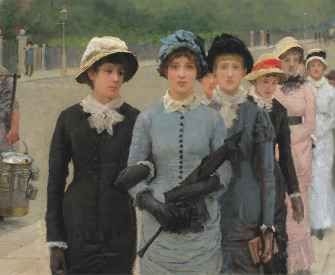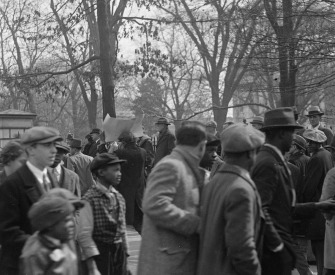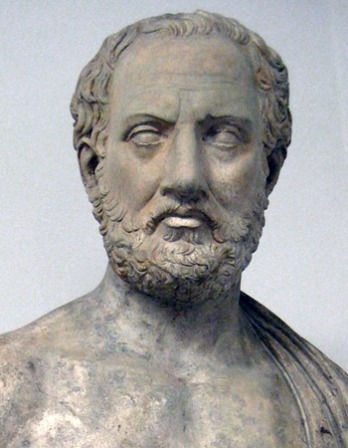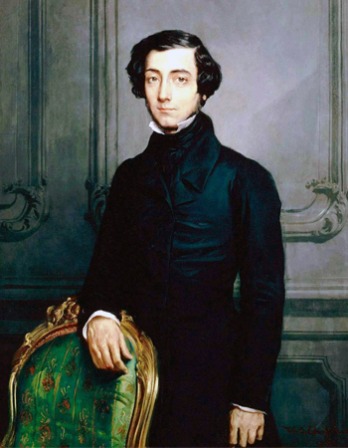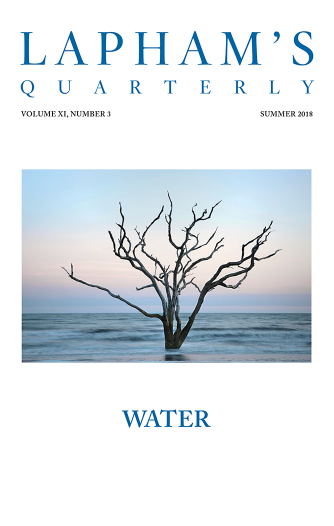I am weary of friends, and friendships are all monsters.
—Jonathan Swift, 1710No Rose Without a Thorn
Thomas Jefferson referees a match between the head and the heart.
My Dear Madam,
Having performed the last sad office of handing you into your carriage at the Pavillon de St. Denis and seen the wheels get actually into motion, I turned on my heel and walked, more dead than alive, to the opposite door, where my own was awaiting me. Mr. Danquerville was missing. He was sought for, found, and dragged downstairs. We were crammed into the carriage, like recruits for the Bastille, and not having soul enough to give orders to the coachman, he presumed Paris our destination and drove off. After a considerable interval, silence was broke with a “Je suis vraiment affligé du depart de ces bons gens.” This was the signal for a mutual confession of distress. We began immediately to talk of Mr. and Mrs. Cosway, of their goodness, their talents, their amiability, and though we spoke of nothing else, we seemed hardly to have entered into matter when the coachman announced the rue St. Denis, and that we were opposite Mr. Danquerville’s. He insisted on descending there and traversing a short passage to his lodgings. I was carried home. Seated by my fireside, solitary and sad, the following dialogue took place between my Head and my Heart.
Head: Well, friend, you seem to be in a pretty trim.
Heart: I am indeed the most wretched of all earthly beings. Overwhelmed with grief, every fiber of my frame distended beyond its natural powers to bear, I would willingly meet whatever catastrophe should leave me no more to feel or to fear.
Head: These are the eternal consequences of your warmth and precipitation. This is one of the scrapes into which you are ever leading us. You will be pleased to remember that when our friend Trumbull used to be telling us of the merits and talents of these good people, I never ceased whispering to you that we had no occasion for new acquaintance; that the greater their merit and talents, the more dangerous their friendship to our tranquility, because the regret at parting would be greater.
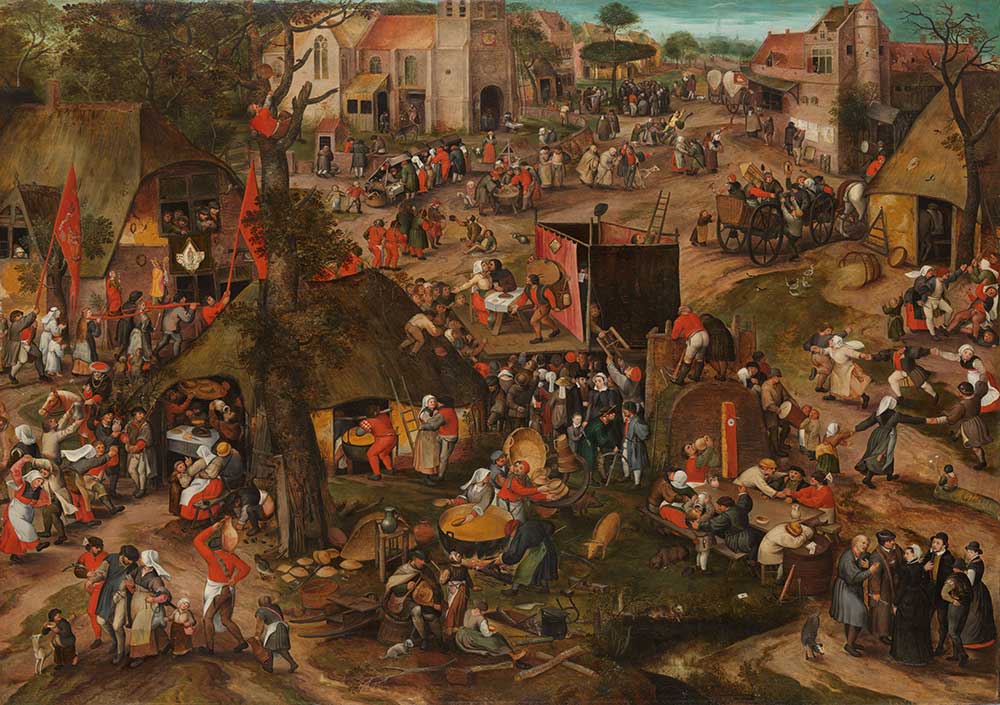
A Performance of the Farce “A Clod from Plaeyerwater” at a Flemish Kermis, by Peeter Baltens, c. 1570. Rijksmuseum, gift of the heirs of C. Hoogendijk, The Hague.
Heart: Accordingly, sir, this acquaintance was not the consequence of my doings. It was one of your projects which threw us in the way of it. It was you, remember, and not I, who desired the meeting, at Legrand & Molinos. I never trouble myself with domes nor arches. The Halle aux Blés might have rotted down before I should have gone to see it. But you, forsooth, who are eternally getting us to sleep with your diagrams and crotchets, must go and examine this wonderful piece of architecture. And when you had seen it, oh! It was the most superb thing on earth! What you had seen there was worth all you had yet seen in Paris! I thought so, too. But I meant it of the lady and gentleman to whom we had been presented, and not of a parcel of sticks and chips put together in pens. You then, sir, and not I, have been the cause of the present distress.
Head: It would have been happy for you if my diagrams and crotchets had got you to sleep on that day, as you are pleased to say they eternally do. While I was occupied with these objects, you were dilating with your new acquaintances, and contriving how to prevent a separation from them. Let us return then to our point. I wished to make you sensible how imprudent it is to place your affections, without reserve, on objects you must so soon lose, and whose loss when it comes must cost you such severe pangs. This is not a world to live at random in as you do. To avoid these eternal distresses, to which you are forever exposing us, you must learn to look forward before you take a step which may interest our peace. Everything in this world is matter of calculation. Advance then with caution, the balance in your hand. Put into one scale the pleasures which any object may offer; but put fairly into the other the pains which are to follow, and see which preponderates. The making an acquaintance is not a matter of indifference. When a new one is proposed to you, view it all around. Consider what advantages it presents, and to what inconveniencies it may expose you. Do not bite at the bait of pleasure till you know there is no hook beneath it. The art of life is the art of avoiding pain; and he is the best pilot who steers clearest of the rocks and shoals with which it is beset. Pleasure is always before us; but misfortune is at our side; while running after that, this arrests us. The most effectual means of being secure against pain is to retire within ourselves, and to suffice for our own happiness. Leave the bustle and tumult of society to those who have not talents to occupy themselves without them. Friendship is but another name for an alliance with the follies and the misfortunes of others. Our own share of miseries is sufficient; why enter then as volunteers into those of another? Is there so little gall poured into our own cup that we must needs help to drink that of our neighbor? A friend dies or leaves us; we feel as if a limb were cut off. He is sick; we must watch over him and participate of his pains. His fortune is shipwrecked; ours must be laid under contribution. He loses a child, a parent, or a partner; we must mourn the loss as if it were our own.
Heart: And what more sublime delight than to mingle tears with one whom the hand of heaven hath smitten! To watch over the bed of sickness, and to beguile its tedious and its painful moments! To share our bread with one to whom misfortune has left none! This world abounds indeed with misery; to lighten its burden, we must divide it with one another. But let us now try the virtues of your mathematical balance, and as you have put into one scale the burdens of friendship, let me put its comforts into the other. When languishing then under disease, how grateful is the solace of our friends! How are we penetrated with their assiduities and attentions! How much are we supported by their encouragements and kind offices! When heaven has taken from us some object of our love, how sweet is it to have a bosom whereon to recline our heads, and into which we may pour the torrent of our tears! Grief, with such a comfort, is almost a luxury! In a life where we are perpetually exposed to want and accident, yours is a wonderful proposition, to insulate ourselves, to retire from all aid, and to wrap ourselves in the mantle of self-sufficiency! For assuredly nobody will care for him who cares for nobody. But friendship is precious not only in the shade but in the sunshine of life; and thanks to a benevolent arrangement of things, the greater part of life is sunshine. I will recur for proof to the days we have lately passed. On these indeed the sun shone brightly! How gay did the face of nature appear! Hills, valleys, châteaus, gardens, rivers, every object wore its liveliest hue! Whence did they borrow it? From the presence of our charming companion. They were pleasing because she seemed pleased. Alone the scene would have been dull and insipid; the participation of it with her gave it relish. Let the gloomy monk, sequestered from the world, seek unsocial pleasures in the bottom of his cell. Let the sublimated philosopher grasp visionary happiness while pursuing phantoms dressed in the garb of truth. Their supreme wisdom is supreme folly; and they mistake for happiness the mere absence of pain. Had they ever felt the solid pleasure of one generous spasm of the heart, they would exchange for it all the frigid speculations of their lives, which you have been vaunting in such elevated terms. Believe me then, my friend, that that is a miserable arithmetic which would estimate friendship at nothing, or at less than nothing. I do forever then disclaim your interference in my province. Fill paper as you please with triangles and squares; try how many ways you can hang and combine them together. I shall never envy nor control your sublime delights. But leave me to decide when and where friendships are to be contracted. You say I contract them at random. I receive no one into my esteem till I know they are worthy of it. Wealth, title, office, are no recommendations to my friendship. On the contrary, great good qualities are requisite to make amends for their having wealth, title, and office. You confess that in the present case, I could not have made a worthier choice. You only object that I was so soon to lose them. We are not immortal ourselves, my friend; how can we expect our enjoyments to be so? We have no rose without its thorn; no pleasure without alloy. It is the law of our existence; and we must acquiesce. It is the condition annexed to all our pleasures, not by us who receive but by him who gives them. True, this condition is pressing cruelly on me at this moment. I feel more fit for death than life. But when I look back on the pleasures of which it is the consequence, I am conscious they were worth the price I am paying.
I thought this a favorable proposition whereon to rest the issue of the dialogue. So I put an end to it by calling for my nightcap. Methinks I hear you wish to heaven I had called a little sooner, and so spared you the ennui of such a tedious sermon. I did not interrupt them sooner, because I was in a mood for hearing sermons. You, too, were the subject; and on such a thesis, I never think the theme long; not even if I am to write it, and that slowly and awkwardly, as now, with the left hand. But that you may not be discouraged from a correspondence which begins so formidably, I will promise you on my honor that my future letters shall be of a reasonable length. I will even agree to express but half my esteem for you, for fear of cloying you with too full a dose. But on your part, no curtailing. If your letters are as long as the Bible, they will appear short to me. Only let them be brim full of affection. Present me in the most friendly terms to Mr. Cosway, and receive me into your own recollection with a partiality and a warmth proportioned not to my own poor merit but to the sentiments of sincere affection and esteem with which I have the honor to be, my dear Madam, your most obedient, humble servant,

Thomas Jefferson
From a letter to Maria Cosway. Jefferson met Maria and Richard Cosway in August 1786 through the artist John Trumbull and was charmed by the woman he described as “a chapter apart” from the rest. Jefferson joined the Cosways and Trumbull daily in their project of “examining and reviewing whatever relates to the arts,” and when Maria left Paris two months later, Jefferson wrote this missive, the only existing love letter in his correspondence. They continued to write each other after Maria moved to Italy. A portrait of Jefferson that Trumbull gave her now hangs in the White House.
